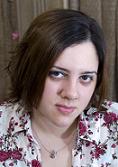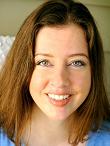What do you believe is the significance of books and why did you want to write them?
 "Before I delve into this question, let me just say that I write because I can't help myself. I can't make it from my bed to my toothbrush in the morning without thinking of something my characters have done/should do/might do, etc. Sometimes I get lucky and am able to string these ideas into a cohesive plot that people would want to read. Now, that being said, I think that books take us away from the world. Like little rocket ships. We forget that we're curled on our couches, or in a waiting room, or mad at our best friend, or that we need to take the garbage out. This is, in my opinion, the purpose of a good work of fiction." - Lauren Destefano, author of Wither.
"Before I delve into this question, let me just say that I write because I can't help myself. I can't make it from my bed to my toothbrush in the morning without thinking of something my characters have done/should do/might do, etc. Sometimes I get lucky and am able to string these ideas into a cohesive plot that people would want to read. Now, that being said, I think that books take us away from the world. Like little rocket ships. We forget that we're curled on our couches, or in a waiting room, or mad at our best friend, or that we need to take the garbage out. This is, in my opinion, the purpose of a good work of fiction." - Lauren Destefano, author of Wither.  "Books are gateways. Movies and television are emphasized these days, but they're passive mediums. Books invite you, not just to be a spectator but to be a participant. You don't get to just watch Harry Potter, you get to BE Harry Potter. As I grew older, I realized that I had stories of my own to tell and that maybe there were people out there who'd want to enter the worlds I'd created as much as I entered the worlds of C.S. Lewis and Tolkien and Susan Cooper when I was a kid." - Shaun David Hutchinson, author of The Deathday Letter.
"Books are gateways. Movies and television are emphasized these days, but they're passive mediums. Books invite you, not just to be a spectator but to be a participant. You don't get to just watch Harry Potter, you get to BE Harry Potter. As I grew older, I realized that I had stories of my own to tell and that maybe there were people out there who'd want to enter the worlds I'd created as much as I entered the worlds of C.S. Lewis and Tolkien and Susan Cooper when I was a kid." - Shaun David Hutchinson, author of The Deathday Letter. "I've always been a voracious reader and I love the way books transport you into another world. I wanted to create worlds and characters that I loved and share them with others." - Andrea Cremer, author of Nightshade.
"Books are significant because stories are significant. Everyone has a story to tell, even the imaginary ones. I wanted to write them because they wouldn't stay in my brain. It's almost an exorcism in a way. If I can get a story or character out of my head and onto the paper, I feel lighter. It's incredibly satisfying to read words back and think, 'That's exactly how I wanted them to be.'" - Robin Benway, author of The Extraordinary Secrets of April, May, and June.
 "Books are amazing. They contain entire worlds, filled with fabulous characters. They can be funny; they can be witty; they can be emotionally gripping. They can teach us something new. They can make us think about things in different ways. They can open our worldview. How can you not get lost in a book? There’s nothing like grabbing a book by a favorite author and curling up with it. I wanted to write books because I have stories to tell, and I want people to read them." - Jackie Kessler, author of Rage.
"Books are amazing. They contain entire worlds, filled with fabulous characters. They can be funny; they can be witty; they can be emotionally gripping. They can teach us something new. They can make us think about things in different ways. They can open our worldview. How can you not get lost in a book? There’s nothing like grabbing a book by a favorite author and curling up with it. I wanted to write books because I have stories to tell, and I want people to read them." - Jackie Kessler, author of Rage.  "Books are significant because they can let us come to know other people, outside of ourselves. We can come to understand and know characters better than we know any other human beings in real life, simply because we are allowed, through the magic of fiction, inside their heads. It's the greatest tool of empathy there is! I wanted to write books from an early age because a) I loved to read and get to know other people's characters, and b)after a while, I started to make up my own characters, and needed to express them." - Cynthia Hand, author of Unearthly.
"Books are significant because they can let us come to know other people, outside of ourselves. We can come to understand and know characters better than we know any other human beings in real life, simply because we are allowed, through the magic of fiction, inside their heads. It's the greatest tool of empathy there is! I wanted to write books from an early age because a) I loved to read and get to know other people's characters, and b)after a while, I started to make up my own characters, and needed to express them." - Cynthia Hand, author of Unearthly."Books are alternate realities we can choose to enter or leave at any time. The ability to create new worlds proves irresistible." - Judith Graves, author of Under My Skin.
"I grew up in a very sheltered environment. Books gave me the world. And that’s what I want to do for kids: Give them the world." - Rae Carson, author of The Girl of Fire and Thorns.
 "Books ask important questions. Sometimes they also suggest answers to those questions, and sometimes they don’t, but the questions are always worth asking yourself, even if they’re as simple as 'what do I want as much as this character wants X?' I don’t know if I have a reason for writing them so much as there were stories in my head that had to come out, and when they did, they were book-length. And I’m glad they were." - Veronica Roth, author of Divergent.
"Books ask important questions. Sometimes they also suggest answers to those questions, and sometimes they don’t, but the questions are always worth asking yourself, even if they’re as simple as 'what do I want as much as this character wants X?' I don’t know if I have a reason for writing them so much as there were stories in my head that had to come out, and when they did, they were book-length. And I’m glad they were." - Veronica Roth, author of Divergent. "Oh, man, I don't even know where to start on the significance of books! Obviously, I think books are the way we tell each other about the world. Not just what it's like, but what it was like. How we survive it. How we connect to it. Books let us know that we're not alone, and that our experiences are universal. As for why I wanted to write them, it's honestly all I know how to do- to
tell stories, and talk about them." - Rachel Hawkins, author of Demonglass.
tell stories, and talk about them." - Rachel Hawkins, author of Demonglass.
 "My mother spent hours reading books to me from the time I was three months old (not kidding, ask her) until I could read myself. And because of her dedication, she instilled in me a love of reading so profound that I truly do not know who I would be if I weren’t a reader. Whether a book makes me cry or think or laugh or swoon or swear, books that provoke reactions have reached me. And for me, it’s that ability, that opportunity to reach people, that makes being a writer so special." - Michelle Hodkin, author of The Unbecoming of Mara Dyer.
"My mother spent hours reading books to me from the time I was three months old (not kidding, ask her) until I could read myself. And because of her dedication, she instilled in me a love of reading so profound that I truly do not know who I would be if I weren’t a reader. Whether a book makes me cry or think or laugh or swoon or swear, books that provoke reactions have reached me. And for me, it’s that ability, that opportunity to reach people, that makes being a writer so special." - Michelle Hodkin, author of The Unbecoming of Mara Dyer.  "I've always been a voracious reader of everything from cereal boxes to fiction, From non-fiction to fantasy, From romance to newspapers, from humor to political commentary, you name it. Pretty much everything except for technical manuals - those I only read if all else fails. As a child, books took me to other worlds. They helped me realize that there were other people who had feelings just like I did, even if, particularly in middle school, they only seemed to exist on the printed pages between the covers." - Sarah Darer Littman, author of Life, After.
"I've always been a voracious reader of everything from cereal boxes to fiction, From non-fiction to fantasy, From romance to newspapers, from humor to political commentary, you name it. Pretty much everything except for technical manuals - those I only read if all else fails. As a child, books took me to other worlds. They helped me realize that there were other people who had feelings just like I did, even if, particularly in middle school, they only seemed to exist on the printed pages between the covers." - Sarah Darer Littman, author of Life, After. "I've always loved stories. When offered in books versus film, a writer has to share more power with the reader. I like that -- I want my reader's imagination to help create the scenery, characters, and pacing of the story. Books widened my heart and mind. I seek to do the same for others." - Mitali Perkins, author of Bamboo People.
"Books allow you to experience the world from someone else's point of view. Even when the POV isn't vastly different from your own, it can be a real eye-opener. And so I like to write books that make readers feel as if their brains have been hijacked by aliens." - Dia Reeves, author of Slice of Cherry.
"I’ve wanted to write books since before I could write…or read for that matter. I’ve always believed stories can take us outside ourselves and expose us to other lives. I think no matter how different we as people are and our experiences, at the core we share so much in common. That is what I hope to express through my books." - Emily Wing Smith, author of The Way He Lived.
"As a lifelong reader, books have always been the ultimate escape for me. To be contributing to that pool, even in a small way, is pretty incredible!" - Kimberly Derting, author of Desires of the Dead.
"Books are a way to share a common experience with scores of people--and I think that's worth a lot. There's something so wonderful and unifying about connecting with someone (either in person or online) who you might not have *anything* in common with except the shared experience of having read (and either loved/hated/or somewhere in between) the same book. I wanted to write books because I love being a vital part of that shared experience." - Kristi Cook, author of Haven.


"When you’re young, you believe anything is possible. But the older you get the more you realize that’s not really true. I can remember being nine years old and reading Bruce Coville’s My Teacher is an Alien series and wishing so hard that I could travel on a spaceship, wanting so much to believe that it was possible. In books, no matter how old you are, the possibilities are still endless and it's fun to suspend your disbelief for awhile." - Holly Hoxter, author of The Snowball Effect.
Come back Tuesday to find out how much of a manuscript the authors are willing to change!



















































This is great! I have always wondered why authors started writing. I sort of feel the same with most of them; I read so much that it just makes you want to write. I am by no means a great writer, and even if I don't get published, it is still a great way to escape reality and make your own world.
ReplyDeleteLove Dia's comment; make her readers feel like their brains have been hijacked by aliens! And that she does! I love her work.
And what Kristi Cook wrote about books giving the readers, bloggers and writer a unique bond. That is so true! I have made so many new friends just over the love of books.
Thank you to all the authors that give us readers a chance to live in your world, and making your stories something we can get lost in, just for a little bit.
Great interview, I loved this!!!
I really like Rae's answer! So sweet.
ReplyDelete